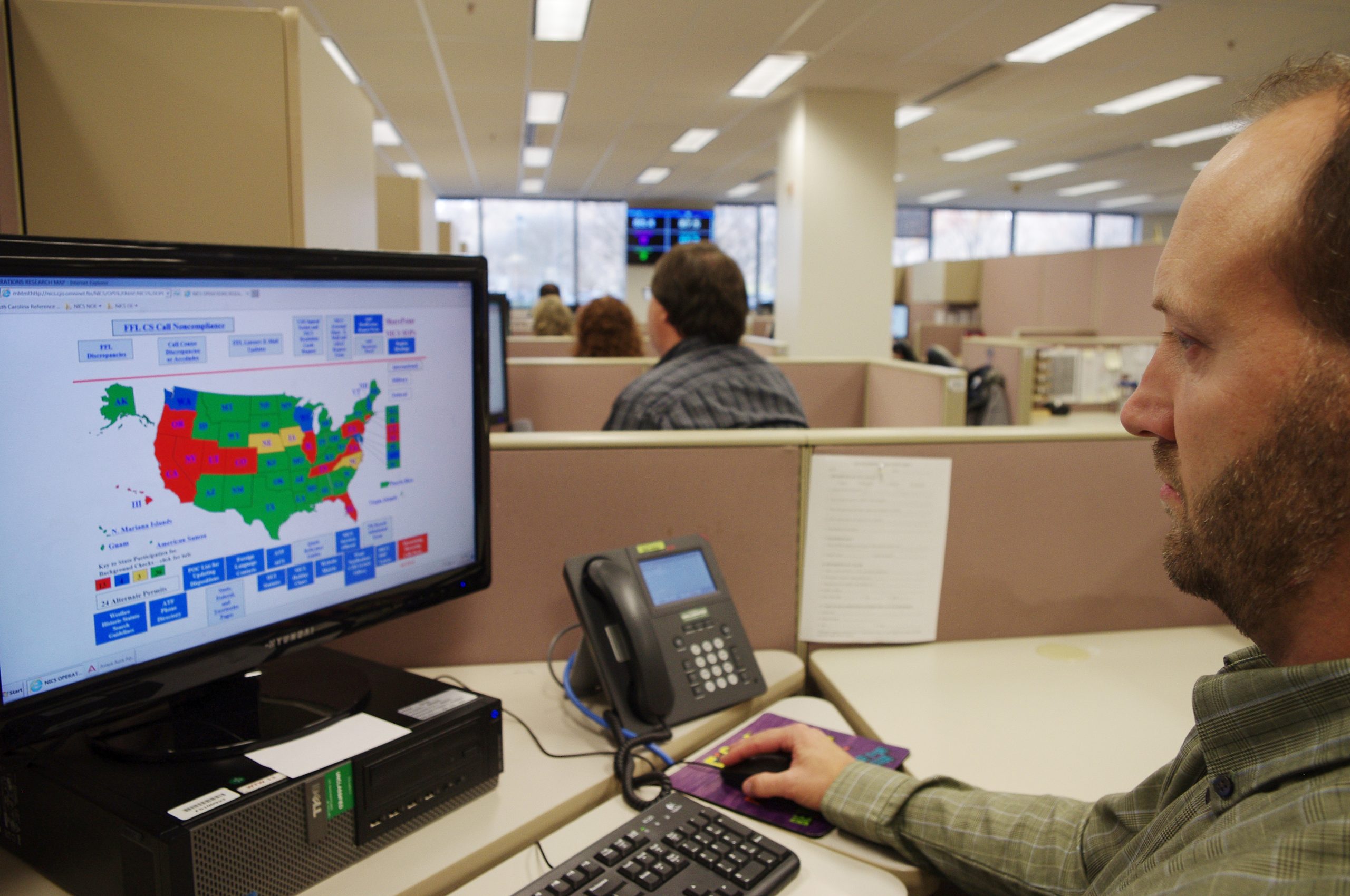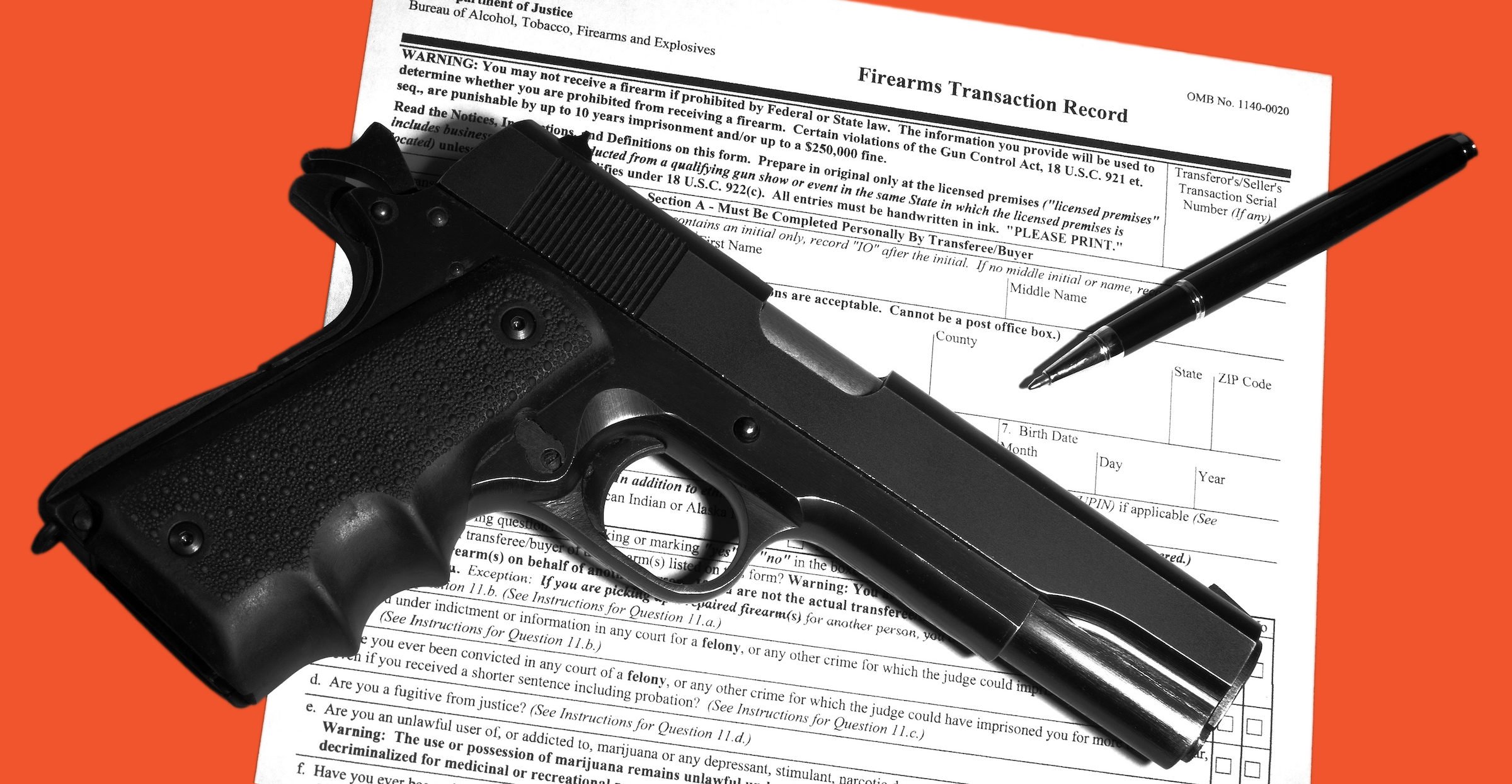The federal gun background check system is suffering from a critical staffing shortage, increasing the risk that people prohibited from buying weapons will slip through the cracks at gun stores.
Right now, sparse staffing at the FBI’s National Instant Criminal Background Check System center in Clarksburg, West Virginia, means that employees can collectively work as much as 2,000 hours of overtime a week, and are often unable to take time off, according to the Department of Justice’s 2018 budget request.
To address the manpower shortage, the Department of Justice is asking Congress for 85 new investigators — a roughly 14 percent staffing increase — at a cost of $8.9 million. The request is part of the $1.3 trillion budget that Congress must pass this week or risk a government shutdown.
The strain is affecting the quality of investigators’ work. About twice as many background checks land in the NICS “delay” queue as they did a decade ago, according to federal data. Hundreds of thousands of background checks extend beyond the three-day window investigators have to complete them. After three business days, a dealer is allowed to sell a gun even if a background check has not cleared the buyer.
Two months ago, a Department of Justice evaluation of NICS found that it “continues to miss performance targets” for how quickly and accurately it completes background checks.
Compounding the problem, experienced background checkers are quitting the overburdened unit. Those who stay are risking their health, the budget request and experts said.
“You can’t appreciate the stress and the strain until there’s a problem, and by then it’s too late,” said Stephen Morris, who was in charge of the FBI’s Criminal Justice Information Services Division, which includes NICS, from 2014 to 2017.
Shortcomings in the federal gun background check system became a source of public concern late last year, when the Air Force admitted that it had failed to enter a domestic violence record into the database that would have prevented the former airman Devin Kelley from buying the weapon he used to murder 26 parishioners at a church in Sutherland Springs, Texas, in November. Since then, lawmakers have focused on the need for federal agencies and states to get complete records into the NICS system, so investigators checking to see whether a person attempting to buy a gun should be prohibited would have all the information they need to make an accurate finding.
The Fix NICS Act, currently pending in Congress, would require federal agencies and encourage states to provide more complete information to the NICS background check databases. Reports circulated on Capitol Hill this week that the bill could be included in the 2018 spending plan that Congress must approve by Friday.
Experts say that making more records available to NICS is essential if checks are to be completed accurately and on time. But they also say that sufficient NICS staffing is a necessity for the federal gun background check system to function as intended, and prevent dangerous people from slipping through the cracks and obtaining lethal weapons.
Gun background checks rose significantly during the Obama administration, from 6.8 million checks completed by NICS in 2011, to almost 9.4 million in 2016 — an increase of about 32 percent. NICS staffing has not kept pace. Since 2011, the number of examiners it employs has increased roughly 22 percent, to a current level of about 610.
The shortage of background check examiners means that NICS has been forced to redeploy workers from other sections to help carry the workload. According to the 2018 budget request, employees normally tasked with handling appeals submitted by people who felt their background check had been wrongly denied have been asked to pinch hit. Shifting analysts from the NICS appeals section left a backlog of 8,119 appeals cases as of December 31, 2016, according to an advisory board report.
Staffers from FBI divisions that conduct explosives and nuclear regulatory checks were also dispatched to the gun background check team.
Morris said he asked for money for additional staff every year he ran the division, but never got as much as he needed.
“In my tenure I don’t ever recall being at a place where we felt like we were adequately staffed,” he said.
Under federal law, anyone who attempts to purchase a gun from a federally licensed firearms dealer must undergo a background check. In 38 states, the FBI is either wholly or partially responsible for performing those screenings. While the majority of checks are finished in minutes, sometimes investigators are required to call call local police departments or court clerks to get the details they need to accurately assess a prospective gun buyer’s records.
NICS background check examiners have three business days to make a determination on a buyer’s fitness to own a firearm, or the dealer is legally permitted to release the gun in what is called a “default proceed” sale.
Data that the FBI shared with the progressive news website ThinkProgress showed that there were more than 300,000 default proceeds in 2016. That figure is up from 270,000 in 2015.
According to Morris, NICS checkers are often so overloaded that they don’t even have time to start a check until they are nearing the end of the 72-hour window.
“There are thousands of them examiners can’t even pull up and look at until the third business day,” he said.
In 2015, Dylann Roof, the gunman who used a Glock pistol to kill nine people at a prayer service in Charleston, South Carolina, was able to buy the weapon because the NICS investigator who did his background check couldn’t uncover the details of a local drug charge in time. As the investigator tried in vain to track down the right local court files, the background check extended past the three-day threshold, and the store legally sold Roof the gun.
“This is not the ideal way to run a background check system,” said Frank Campbell, who managed NICS from its launch until he left the government in 2008. Campbell is now a security consultant in private practice.
“If you don’t have enough people, the research is not always going to get done in three business days,” he said. “You could have a situation where someone gets the firearm when they’re prohibited.”

